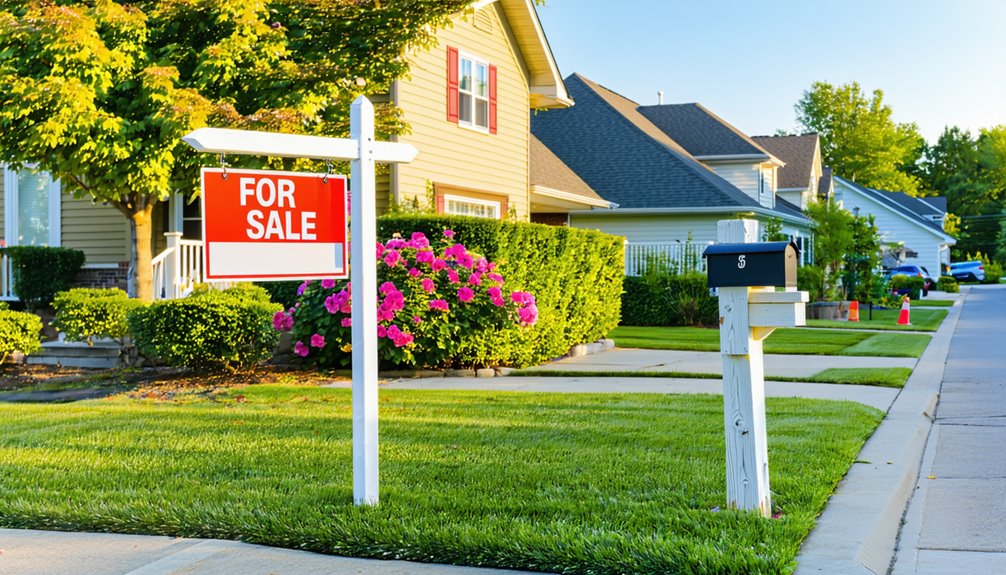
This post was last modified on June 23, 2025.
When you’re thinking about buying a home in an HOA community, you may not know how much those monthly fees can affect what your property is worth. When fees are fair, they usually make the neighborhood more attractive and can help you get more money when you sell. On the other hand, high fees might scare off potential buyers, making your investment riskier. So, how do you navigate this delicate balance? Understanding the various factors at play could make all the difference in your real estate experience.
Positive Effects of HOA Fees
HOA fees can help your property value in several different ways. One significant impact comes from regular maintenance of properties, which boosts community aesthetics. Since HOA fees pay for yard work, keeping the neighborhood looking nice, and parking rules, homeowners don’t have to worry about these things while their properties stay attractive. This consistent upkeep prevents decline in property value over time, contributing to overall property appreciation.
Shared amenities, such as parks, clubhouses, and fitness centers, also elevate property values in HOA communities. By covering the maintenance of these facilities, HOA fees enhance the desirability of neighborhoods, making them attractive to potential buyers and renters alike.
Homes in HOA communities usually have higher values because the neighborhoods are well-maintained and offer shared facilities. However, claims such as properties being valued at a specific percentage higher or selling at a premium require substantiation with reliable market data sources to avoid misleading conclusions.
Additionally, the California real estate market’s limited supply highlights the advantages of properties within well-managed communities, making them even more appealing to buyers.
Negative Consequences of HOA Fees
Many homeowners worry about high HOA fees because they make homes harder to afford and can hurt property values. These fees can create significant financial strain, deterring potential buyers and affecting the marketability of homes.
Here are four key negative consequences of high HOA fees:
- Reduced Affordability: High fees make homes less affordable, particularly for first-time buyers, limiting your buyer pool.
- Buyer Deterrence: Excessive fees often discourage buyers from considering properties in HOA communities, leading to longer selling times.
- Market Value Decline: Sellers may have to lower their asking prices to attract buyers, which can lead to a decrease in overall property values in the area.
- Unexpected Financial Burdens: Special assessments for repairs can create financial distress, potentially forcing homeowners into unfavorable sales situations.
These factors contribute to how high HOA fees can diminish property desirability and value over time. Additionally, understanding market dynamics can help homeowners make informed decisions regarding their investments in HOA-governed communities.
Key Factors Influencing Fees
Several key factors influence HOA fees, shaping the financial environment for homeowners within these communities. One major component is operational costs, which encompass utilities, maintenance, and insurance for common areas. Larger communities or those in prime locations typically incur higher operational expenses due to shared space upkeep, such as gardening and repairs.
In addition to these costs, reserve fund contributions play a critical role in determining fees. These funds make sure money is saved for unexpected costs and big repairs, so you won’t get hit with surprise bills later. While robust reserve funds provide financial stability, they can also lead to increased HOA fees. Long-term planning for future needs, rather than new features, is key for maintaining a healthy community.
Amenities and services also influence HOA fees; luxurious facilities like pools and gyms drive up costs. Moreover, economic factors, such as inflation and rising labor costs, can impact your dues. Understanding the legal implications of fixtures in property ownership can also help homeowners appreciate the value of their investments and the role of HOA fees in maintaining shared property standards.
Effective budget management and transparent communication from the HOA can help mitigate some of these expenses, guaranteeing that you’re aware of how your fees are allocated and spent.
As a future real estate agent in California, understanding HOA fees is important for helping your clients make smart decisions. When you’re showing homes in HOA communities, you’ll need to explain how these fees work and what they cover. Many buyers don’t realize that HOA fees can change over time, and some might not budget for them properly. Being able to break down the costs and benefits will make you a more trusted advisor. You’ll also want to know how to research an HOA’s financial health by looking at their budget and reserve funds, since this information can help your clients avoid communities with potential problems.
Market Dynamics of HOA Fees
Steering through the complexities of HOA fees reveals considerable market fluctuations that influence property values across various regions. As you navigate this terrain, it’s significant to understand how buyer perceptions can shift based on rising fees and special assessments.
Here are some key aspects to reflect on:
- Double-digit increases in HOA fees, especially in Florida cities like Tampa (17.2%) and Orlando (16.7%).
- A national increase of 5.7% in HOA fees across the largest housing markets, impacting affordability.
- Buyer sensitivity to high fees can deter potential purchases, making it a deal-breaker for some.
- Comparison with similar properties helps buyers assess whether the fees align with the property’s value.
Additionally, many buyers may overlook the significance of closing costs that can further impact their overall budget when purchasing a property.
These regional variations in HOA fees create distinct market conditions. In high-risk markets like Florida, the financial pressure from increased costs leads to a decline in condo sales and extended days on the market.
Effective HOA Management Strategies
Rising HOA fees can greatly impact property values, making effective management strategies key for maintaining community appeal and financial stability. To achieve this, clear objectives must guide your decision-making, guaranteeing that every action aligns with the community’s vision.
Regular updates through newsletters and digital platforms foster community engagement, keeping residents informed and involved. Financial transparency is important. You should maintain a healthy budget and conduct regular reserve studies to anticipate future repair needs.
Establishing clear dues policies can prevent confusion regarding payment schedules. It’s also critical to prepare for board meetings with organized agendas to facilitate efficient discussions and decision-making.
Conflict resolution strategies should prioritize neutrality, using mediation techniques to resolve disputes amicably.
Collaborating with property managers as partners ensures that community management runs smoothly and effectively.
Balancing effective communication, financial oversight, and conflict management will position your HOA for long-term success.
Frequently Asked Questions
How Often Can HOA Fees Be Increased?
HOA fee increase frequency varies based on local regulations and state laws. You have member voting rights, potentially influencing increases beyond set caps, ensuring transparency through proper notice, justifications, and adherence to governing documents.
Are HOA Fees Tax-Deductible for Homeowners?
HOA fees aren’t typically tax-deductible for homeowners. However, if you use part of your home for business, you might claim some deductions. Consulting a tax professional can help you explore potential tax benefits and homeowner deductions.
Can Homeowners Contest HOA Fee Increases?
Yes, you can contest HOA fee increases by understanding your homeowner rights and demanding fee transparency. Review your governing documents, engage with neighbors, and attend board meetings to effectively advocate for key dues adjustments.
What Happens if I Don’t Pay HOA Fees?
If you don’t pay HOA fees, you’ll face legal consequences like late fees, liens, and potential foreclosure. Exploring payment plans can help you manage debts and avoid escalating financial issues while maintaining your community privileges.
How Are HOA Fees Calculated for New Properties?
HOA fees for new properties are calculated based on HOA fee structures, including total expenses, reserve contributions, and miscellaneous income. New property assessments factor in location, amenities, and community size to determine individual fees.




